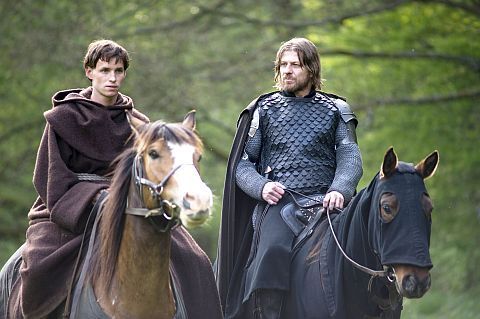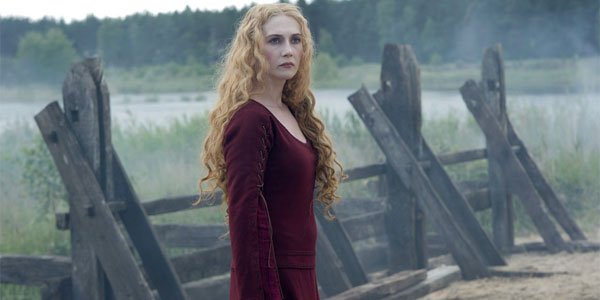Geekscape Movie Reviews: Black Death
In its look, Christopher Smith’s film “Black Death,” set in the early 15th century, and following a group of hard-ass knights on a quest to rid the world of witchcraft, looks like another dull action-laden period piece in the line of equally dull features like “300” and “Centurion” and “King Arthur;” that is: the action scenes are cut so quickly and shot so haphazardly that you can’t really tell what’s going on in the film for long stretches. You can hear swords slicing tenderly through layers of human tendon, and you can see splatters of mud and blood all over the camera’s lens, but you can’t really get a feel for who is doing what to whom, nor can you discern any sort of geography. This is a problem with most action films of the day; they are too quickly edited, and the camera is too enthused to zip in and out of the action. When the action ramps up, I declare, that is a good time to get your camera to stay still.
In its feel, however, “Black Death” feels a lot like a Mario Bava film. Or perhaps a Dario Argento-scripted Euro-schlock film from the 1970s. And while it’s not as much wicked fun as one of those films, it does have a very bleak, anti-everything, European feeling to it (which is no wonder; its screenwriter Dario Poloni, is Italian). It’s a film with acres of rotting skin (it is about the bubonic plague), a healthy dose of magick, and a philosophy that seems to come down very hard on both Christians and Pagans equally. This is a film that may not be revolutionary in its thought processes, but, at the very least, has something on its mind.

Eddie Redmayne plays a novice named Osmund who is questioning his faith. He is torn between staying in the church (at the time of the Black Death, when the veracity of the church came under serious fire from the locals, which isn’t entirely based on fact, but whatever), and running off to live with his childhood sweetheart and have a family. When he asks God for a sign as what to do, Sean Bean appears in his life. Bean plays a knight named Ulric, and Ulric has been assigned to go to a village out in the boonies where there doesn’t appear to be any plague. Witchcraft is suspected. If the people are merely blessed, the knights are to leave them alone. If they are staying healthy by magical means, they are to be executed. Simple. Osmund decides to lead Ulric through the local marsh to the village.
Ulric is supposed to be a hero, I guess. But he is seen killing a woman in cold blood at one point. This scene is used to accentuate what a badass he is, but it comes across as largely unnecessary. In fact, all the knights (with names like Dalywag and Wolfstan) seem to come across as a dangerous mix of heroic badasses and insane, bloodthirsty savages.
When we finally get to the village, it does indeed have a creepy, cultish vibe. The village is run by the witchy-looking Carice Van Houten in a fright wig and a red dress. There is indeed no plague here, and the villagers are clearly up to something, but it’s unclear as to whether or not they want to kill or to indoctrinate the knights. It turns out that they have a serious anti-Christian agenda, and some stabbing occur in a lengthy trial sequence.

The film could be said to be a savvy allegory about the cycle of accusation that occurs in any time of crisis. One party will point a finger at another, and the other will, in turn, point right back for doing the pointing. And while the film comes down on a depressingly ambiguous note, the wrong people are killed, and souls are corrupted (which may sound dour enough!), it at least doesn’t get too preachy about any religious dogma (compare it to, say, the strident “Agora” from last year). If it has any philosophy behind it, its nihilism.
I think I can recommend this film, though. Despite its bleakness and confusing action, it, at the very least, has something clearly on its mind. For a modern film of ancient mayhem, that actually puts it very slightly ahead of its peers. If, however, the thought of ancient mayhem bores you, then “Black Death” will do nothing to distinguish itself.
